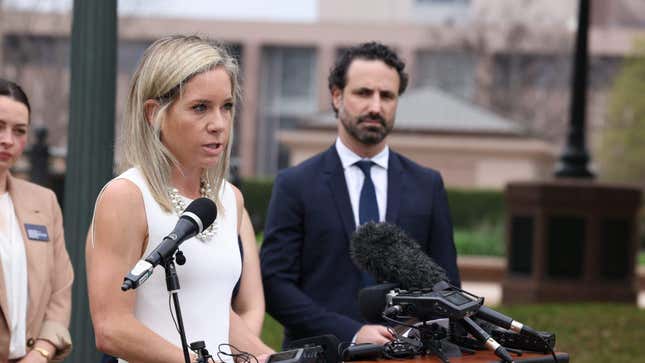Texas Women Begin Heartbreaking Testimony in Case Against State Abortion Bans
One plaintiff, who was denied an abortion after her fetus was diagnosed with anencephaly, vomited on the witness stand when asked to detail her experience.
AbortionPolitics

In March, after being forced by Texas’ abortion laws to carry to term a nonviable pregnancy that threatened her life, Samantha Casiano gave birth to a three-pound baby who died four hours after birth. Casiano, a mother of four young kids, testified about her experience in court on Wednesday. After explaining that she was unable to publicly share where exactly in Texas she lived due to safety concerns from a previous abusive relationship, Casiano began to vomit while at the witness stand when asked about the specifics of her harrowing experience.
Casiano’s fetus, who had an anencephaly and would be born without a skull, “was going to die inside or outside of my womb,” she had testified earlier through tears.
On Wednesday, a Texas district court judge heard the first day of arguments for Zurawski v. State of Texas, a landmark case that seeks to clarify a dangerously confusing exception to the state’s archaic abortion laws. The suit is brought forth by 13 Texas women who say they almost died from life-threatening pregnancy-related complications and were still unable to get emergency abortion care, even though the state’s abortion bans include a hypothetical exception for such cases. Health care providers in violation of Texas’ laws face the threat of life in prison, a $100,000 fine, and loss of their medical license.
The plaintiffs, represented by the Center for Reproductive Rights, are asking the judge to grant a temporary injunction on the abortion bans, while the state is asking for the suit to be dismissed altogether.
One plaintiff, Amanda Zurawski, says she experienced severe pregnancy-related complications that led to a life-threatening sepsis infection and the permanent closure of her right fallopian tube—an outcome that’s jeopardized her fertility even as she still hopes to have kids. She’s just one of the plaintiffs who’s expressed concern about potential infertility as a ripple effect of the state abortion ban. But the state of Texas is actually using that issue against the plaintiffs as it tries to throw out the case: Attorneys for the state argued in court on Wednesday that the women don’t have standing to challenge the abortion laws because it’s not certain they’ll become pregnant and experience life-threatening pregnancy complications again. Their experiences with being denied care are “tragic, but in the past,” a state attorney said.
In a motion to dismiss the suit filed last week, the state argued that none of the women have claimed “they are relatively certain to become pregnant again,” and “in fact, several of the patients have admittedly struggled to become pregnant.” Zurawski, testifying before the court on Wednesday, said this framing is “infuriating and disgusting and ironic.” She continued, “Do they not realize the reason why I might not be able to get pregnant again is because of what happened to me as a result of the laws that they support? … Anybody who’s been through infertility will tell you it is the most isolating, grueling, lonely, difficult thing a person can go through.”
-

-

-

-

-

-

-

-

-

-

-

-

-

-

-

-

-

-

-

-

-

-

-

-

-

-

-

-

-

-

-

-

-

-

-

-

-

-

-

-








































